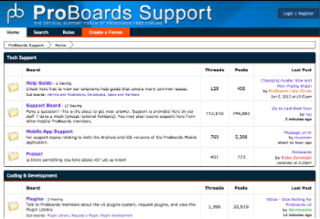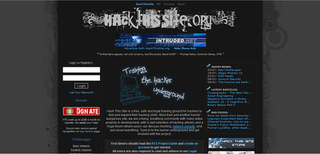A bulletin board system or BBS is a computer server running software that allows users to connect to the system using a terminal program. Once logged in, the user can perform functions such as uploading and downloading software and data, reading news and bulletins, and exchanging messages with other users through public message boards and sometimes via direct chatting. In the early 1980s, message networks such as FidoNet sprang up to provide services such as NetMail, which is similar to email.

Warez is a common computing and broader cultural term referring to pirated software that is distributed via the Internet. Warez is used most commonly as a noun, a plural form of ware, and is intended to be pronounced like the word wares,. The circumvention of copy protection (cracking) is an essential step in generating warez, and based on this common mechanism, the software-focused definition has been extended to include other copyright-protected materials, including movies and games. The global array of warez groups has been referred to as "The Scene", deriving from its earlier description as "the warez scene". Distribution and trade of copyrighted works without payment of fees or royalties generally violates national and international copyright laws and agreements. The term warez covers supported as well as unsupported (abandonware) items, and legal prohibitions governing creation and distribution of warez cover both profit-driven and "enthusiast" generators and distributors of such items.
Uploading refers to transmitting data from one computer system to another through means of a network. Common methods of uploading include: uploading via web browsers, FTP clients, and terminals (SCP/SFTP). Uploading can be used in the context of clients that send files to a central server. While uploading can also be defined in the context of sending files between distributed clients, such as with a peer-to-peer (P2P) file-sharing protocol like BitTorrent, the term file sharing is more often used in this case. Moving files within a computer system, as opposed to over a network, is called file copying.
The File Transfer Protocol (FTP) is a standard network protocol used for the transfer of computer files between a client and server on a computer network.

An Internet forum, or message board, is an online discussion site where people can hold conversations in the form of posted messages. They differ from chat rooms in that messages are often longer than one line of text, and are at least temporarily archived. Also, depending on the access level of a user or the forum set-up, a posted message might need to be approved by a moderator before it becomes publicly visible.
Topsite is a term used by the warez scene to refer to underground, highly secretive, high-speed FTP servers used by release groups and couriers for distribution, storage and archiving of warez releases. Topsites have very high-bandwidth Internet connections, commonly supporting transfer speeds of hundreds to thousands of megabits per second; enough to transfer a full Blu-ray in seconds. Topsites also have very high storage capacity; a total of many terabytes is typical. Early on these warez sites were mainly distributing software such as games and applications after the release groups removed any protections. Now they are also a source of other copyright protected works such as movies and music. It is strictly prohibited for sites to charge for access to the content, due to decreased security, and sites found doing so are shunned by the topsite community.
File eXchange Protocol is a method of data transfer which uses FTP to transfer data from one remote server to another (inter-server) without routing this data through the client's connection. Conventional FTP involves a single server and a single client; all data transmission is done between these two. In the FXP session, a client maintains a standard FTP connection to two servers, and can direct either server to connect to the other to initiate a data transfer. The advantage of using FXP over FTP is evident when a high-bandwidth server demands resources from another high-bandwidth server, but only a low-bandwidth client, such as a network administrator working away from location, has the authority to access the resources on both servers.

Superior Art Creations (SAC) is an underground artscene group which caters primarily to and is well known within the warez scene. SAC members have made, besides ANSI and ASCII art, VGA bitmap graphics, tracker music, and a variety of other works. SAC's character graphics have also been used in bottles and FTP servers.

ProBoards is a free, remotely hosted message board service that facilitates online discussions by allowing people to create their own online communities.
A warez group is a tightly organised group of people involved in creating and/or distributing warez such as movies, music or software ("warez") in The Scene. There are different types of these groups in the Scene: release groups and courier groups. Groups often compete, as being the first to bring out a new quality release can bring status and respect – a type of "vanity contest". The warez groups care about the image others have of them.
File Service Protocol (FSP) is a UDP-based replacement for the File Transfer Protocol, designed for anonymous access with lower hardware and network requirements than FTP. In particular, because it uses UDP, it avoids the problems that many FTP servers have had with requiring a separate process for each client, and because it is built to use an unreliable protocol, it can more easily handle resuming a transfer after a network failure.

The Warez scene, often referred to as The Scene, is an underground community of people that specialize in the distribution of warez: copyrighted material, including television shows and series, movies, music, music videos, games, applications, ebooks, and pornography. The Scene is meant to be hidden from the public, only being shared with those within the community. However, as files were commonly leaked outside the community and their popularity grew, some individuals from The Scene began leaking files and uploading them to filehosts, torrents and ed2k.

FlashFXP is a proprietary FTP client with a simple Windows-based GUI. FlashFXP supports both client-to-server and server-to-server (FXP) transfers, in addition to SCP/SFTP.
An image hosting service allows individuals to upload images to an Internet website. The image host will then store the image onto its server, and show the individual different types of code to allow others to view that image. Some of the best known examples are Flickr, Imgur and Photobucket, each catering for different purposes.
A pubstro is a computer that has been cracked into, and had an FTP server installed. This FTP server is used to facilitate the transferring and spreading of warez, or copyrighted software.

HackThisSite.org, commonly referred to as HTS, is an online hacking and security website founded by Jeremy Hammond. The site is maintained by members of the community after his departure. It aims to provide users with a way to learn and practice basic and advanced "hacking" skills through a series of challenges in a safe and legal environment. The organization has a user base of over a million, though the number of active members is believed to be much lower. The most users online at the same time was 19,950 on February 5, 2018 at 2:46:10 AM CST.
glFTPd is a freely available FTP server which runs on Unix, Linux, and BSD operating systems. It has number of features, like logins restricted by a particular set of IP addresses, transfer quotas per-user and per-group basis, and user/groups not stored in the system files, which make it attractive to private warez servers, including topsites. It does have legitimate uses though—a number of web development books recommend it amongst other general purpose FTP servers, and some Linux certification exams of SAIR required knowledge of it. It can integrate with Eggdrop through IRC channels.
Max Ray Vision is a former computer security consultant and hacker who is serving a 13-year prison sentence, the longest sentence ever given at the time for hacking charges in the United States. He was convicted of two counts of wire fraud, including stealing nearly 2 million credit card numbers and running up about $86 million in fraudulent charges.

Heartbleed is a security bug in the OpenSSL cryptography library, which is a widely used implementation of the Transport Layer Security (TLS) protocol. It was introduced into the software in 2012 and publicly disclosed in April 2014. Heartbleed may be exploited regardless of whether the vulnerable OpenSSL instance is running as a TLS server or client. It results from improper input validation in the implementation of the TLS heartbeat extension. Thus, the bug's name derives from heartbeat. The vulnerability is classified as a buffer over-read, a situation where more data can be read than should be allowed.








